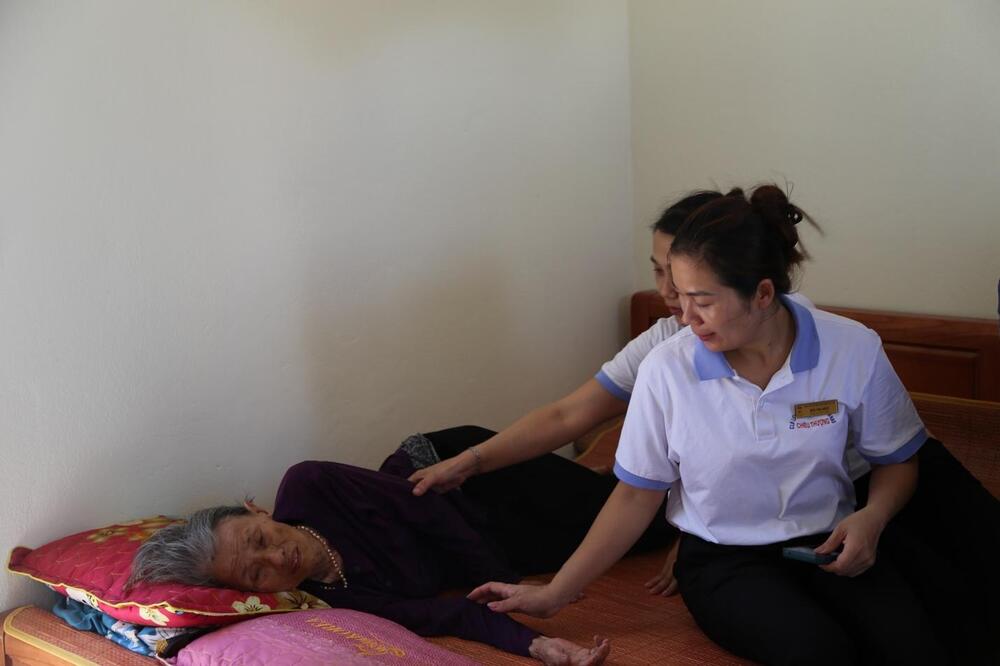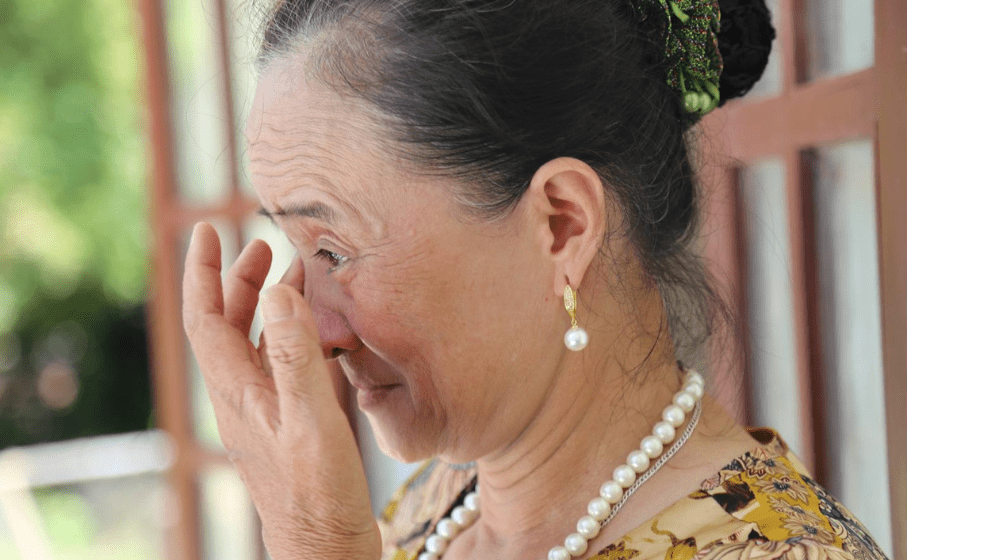For as long as Bich could remember, her mother had been her pillar of strength. But now, at the age of 84, her mother’s mind was slipping away, and dementia had slowly started stealing the woman Bich once knew. Every morning, long before the sun painted the sky, Bich's day began at 4:30. She would prepare meals, gather essentials, and travel 4 kilometers from her house to her mother's to care for her.
“There were days when I found my mother disoriented, wandering aimlessly, or sitting in a corner, unable to understand where she was. One particularly painful morning, I entered the house and found my mother in tears, sitting in a puddle of urine on the kitchen floor.” – Bich confessed to UNFPA in Viet Nam, Help Age International and Vietnam Elderly Association during their visit to her house, located in Chieu Thuong Village, Thanh Hoa Province.

“I felt helpless” – Bich continued - “My father passed away a few years ago. I have a younger sister, but she is so busy with her own family. The weight of caring for my mother alone, while balancing the responsibilities of my own family, is suffocating”. Sleepless nights and constant worry left her feeling isolated, overwhelmed, and on the verge of giving up. Without any support network, she struggled to cope, battling exhaustion both physically and mentally.
“Like many others in the village, we struggled to make ends meet. I want to build a proper house for her, so I’ve saved money from years of hard work and luckily, received a small amount of money from the local government, but the project remained unfinished.” – Bich said.
The yard outside was cluttered with scattered bricks, wooden planks, and unused cement bags, unused materials for a home that was meant to offer comfort and stability but had instead become a daily reminder of her overwhelming responsibilities. With no time to spare between caring for her mother and managing her own family, Bich couldn't find anyone to help complete the house.
“The unfinished house is a symbol of the many things I could not complete—not for lack of trying, but because my burdens were simply too great. The physical and emotional weight of my responsibilities kept me from giving her the secure home I desperately wanted to provide.” – Bich continued.
But things have changed since UNFPA in Viet Nam collaborated with HelpAge International to launch the Integrated Care for Older People (ICOPE) model in Thanh Hoa Province. Building on the nationwide network of Intergenerational Self-Help Clubs (ISHC) the initiative was designed to provide support for older people in communities, with a special focus on facilitating their access to essential healthcare and other support services. Joining the intervention, families like Bich’s no longer had to bear the burden alone.

The model, which connects caregivers like Bich to a network of volunteers, provided her with both practical and emotional support. Every week, trained volunteers would visit Bich’s mother, helping with her care—whether it was bathing her, providing company, or simply ensuring her comfort.
The support also extended beyond physical care; volunteers checked in with Bich regularly, offering advice and encouraging her to take respite breaks. These caregivers brought with them a sense of community, fostering a bond built on trust and connectedness. What made the programme truly unique was how it tapped into the local neighbourhood, relying on the spirit of volunteerism to offer care without a large financial burden.
“You know what? I’m not alone anymore.” - Bich smiled and placed her hand on a volunteer’s hand - “With the support from the ISHC and my neighbors, my burden feels lighter. I have learned practical ways to care for my mother and, more importantly… how to take care of myself too.”

In addition to benefiting from the ICOPE model, Bich also became an active member of the ISHC. Once a month, the club members gather, transforming the somber routine of caregiving into something much brighter. They not only share their experiences in caring for the elderly, they come together to sing, dance, and engage in team-building activities. There’s a physical exercise to keep everyone moving, but it’s the laughter that fills the air, turning the Commune People's Committee meeting room into a sanctuary of joy and community. For Bich, these moments have become a cherished escape – a time to connect, laugh, and find strength in the collective spirit of those who understand her journey.

The once-hidden truth of Bich’s life - the silent suffering she endured - is no longer her burden to carry alone. Thanks to the support from UNFPA and HelpAge International, Bich has found not only relief but also purpose.
As Viet Nam started the ageing period in 2011, becoming one of the fastest population ageing countries in the world, and will enter the aged population by 2036, models like ICOPE are becoming increasingly vital. The ICOPE model not only supports individual caregivers like Bich but also addresses the broader social challenge of providing comprehensive care services for an ageing society. By fostering a community-based approach, the model eases the pressure on public health systems and families by encouraging local participation and shared responsibility for elder care.
With relatively low running costs, the ICOPE model has proven scalable and replicable, ensuring that older people in different provinces can receive the same level of compassionate, effective care. It highlights how neighbourhood supports networks, trust, and volunteerism can be harnessed to create a more inclusive, sustainable system that ensures older citizens live with dignity, while their caregivers are supported in ways that improve their overall well-being. This approach aligns with Viet Nam’s long-term strategy to address the needs of its rapidly ageing population while promoting social cohesion and resilience.


